Awareness Ribbons
What does white symbolize? It depends on where you live. In some countries,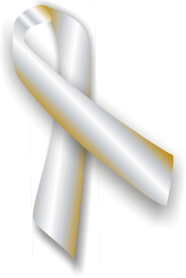 white is the color of purity, in others; it is the color of mourning.
white is the color of purity, in others; it is the color of mourning.
In November in the US, white is the color for the lung cancer awareness ribbon. As an awareness color, it represents a characteristic of lung cancer; lung cancer symptoms often go unnoticed.
Lung Cancer Symptoms
The symptoms of lung cancer are like other, less serious diseases. For example, lung cancer’s earliest symptoms- coughing, wheezing, chest pain, and fatigue-are similar to the flu, asthma or pneumonia. Only as the cancer spreads do more serious symptoms, like blood in sputum, pain or difficulty swallowing, or a high-pitched sound when taking a breath-give a clue that something is seriously wrong. By then, the cancer is advanced.
Rates of Survival
Survival rates for lung cancer are the same as they were in the 1970s. People who are diagnosed with Stage 1A and 1B non-small cell lung cancer have only a 49% and 45% chance of 5-year survival. For all lung cancers, the 5-year survival rate is only around 15%.
Funding Concerns
According to the National Cancer Institute, in 2013 the investment in lung cancer research was $285.9 million, while that same year the investment in breast cancer research was $559.2 million. As these figures attest, breast cancer research funding was almost twice as much as lung cancer funding. The survival statistics and this funding imbalance speak to the need for a change in thinking about lung cancer.
“Lung cancer has an image problem. The first question I hear when I mention my disease is: ‘Did you smoke?’ People blame patients for getting lung cancer. The breast cancer community has changed how the world sees their disease. The lung cancer community must do the same. We’ve all done things that impact our health. Yes, it’s healthier not to smoke. But it’s not a sin that warrants the death penalty.”
Stigma
An incident revealing this image problem occurred in February 2015 when a well-known journalist died. Tributes flowed.
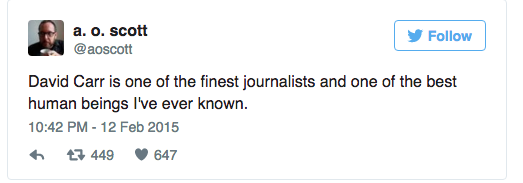
Until two days later when the tweets were about the cause of his death.
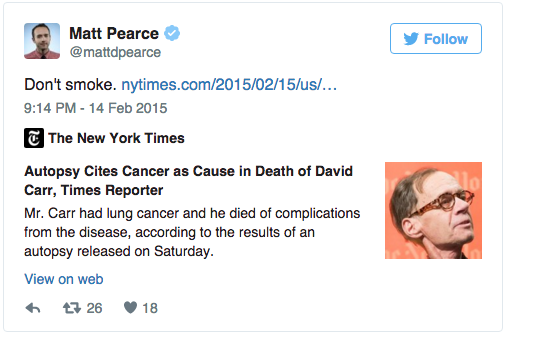
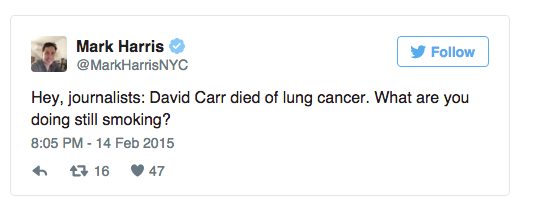
Most people have incidents of overeating, being a couch potato, sitting for long periods of time, having more than one glass of wine in an evening. These unhealthy behaviors are usually not discussed after diagnosis or death from other cancers. Yet empathy seems to be missing for people who get lung cancer—they “should have known better” is the attitude many lung cancer patients experience. Even a 6 year old child who lost a lung to cancer felt she must tell people, “I didn’t even smoke!”
In his Washington Post article on Twitter and David Carr’s death, Todd Frankel wondered what the point of using this man’s death as part of a smoking awareness campaign was? It seemed to be just another way to say lung cancer is self-inflicted or even deserved.
The numbers tell the story: when you look at just the death rates of nonsmokers, lung cancer is in the top 10 deadliest types of cancers. This stigma interferes with funding research on lung cancer. It interferes with getting people to go for screening; it causes some to hide their disease. And, it categorizes everyone under the “blame” umbrella.
Fundraising for Lung Cancer
Moving beyond the stigma associated with lung cancer is essential for research to move forward. The Wear Pearls In November is a fundraiser to show your support for people with lung cancer. Monies raised go to the Lungevity Foundation.
Suzanne Corrales, an athletic, healthy nonsmoker, was diagnosed with lung cancer at age 47. The reaction from others (when she shared her diagnosis) negatively impacted her and reduced the quality of the time that she had left to live. Her daughter has started the Pearl Project to change the conversation. The goal is “to create an educational awareness movement toward a world where no one is blamed for having cancer.”
Our human compassion binds us the one to the other – not in pity or patronizingly, but as human beings who have learnt how to turn our common suffering into hope for the future. ~Nelson Mandela
**Medivizor is not affiliated with The Pearl Project.

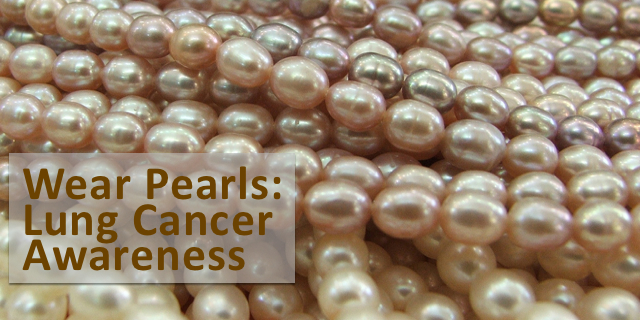






I two was treated for lung cancer & the first question asked was “do you smoke & for how long?”. I celebrated my 2nd anniversary last July after treatment. Hopefully I can go another 2 years. I had alot of prayers said for me, but in the end we are ALL under God’s hand.
I would like to post a blessing and pray for my sister-in-love, Anne, I’m wearing my pearls every day sweetheart! The prayers are all for you.
And Sidley, I meant to say what a blessing you are to be here with us. Thank you for sharing your experience so we can all hope for the love of God’s hands to hold us.
I just had a lobectomy and i am now cancer free! I was very lucky it was caught early. Praise God!
It’s on that I just recently found out in the November that I have stage 4 lung cancer simply by going to the ER with a nosebleed my entire world was turned upside down. but I have high spirits I stay positive and I have a battle ahead of me and ultimately that’ll probably be the war that gets me but I still have good days to ahead of me so stay positive everyone
An informative & useful article on lung cancer. Thank you for sharing.